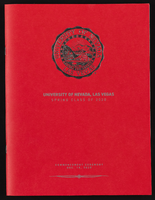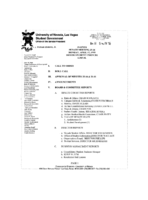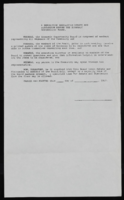Search the Special Collections and Archives Portal
Search Results

Transcript of interview with Dr. James Deacon by Mary K. Keiser, August 24, 2006
Date
Archival Collection
Description
Text

Transcript of interview with Mary Laub by Wendy Starkweather, December 02, 2013
Date
Archival Collection
Description
Text

University of Nevada, Las Vegas (UNLV) Spring 2020 commencement program
Date
Archival Collection
Description
Commencement program from University of Nevada, Las Vegas Commencement Programs and Graduation Lists (UA-00115).
Text
Alpha Kappa Alpha Sorority. Theta Theta Omega Chapter (Las Vegas, Nev.)
Corporate Body Alternate Name
Alpha Kappa Alpha, Incorporated (AKA), is one of the oldest Black sororities in the United States, and was
founded on January 15, 1908 at Howard University in Washington, D.C. AKA is an international service
organization that comprises nearly 300,000 members in over 1,000 graduate and undergraduate chapters
worldwide.
Theta Theta Omega originally started in 1962 when six members of AKA sought to create a graduate
chapter in Las Vegas, Nevada. AKA recruited members by posting notices throughout the Clark County
Corporate Body

Meeting minutes for Consolidated Student Senate University of Nevada, Las Vegas, April 17, 1995
Date
Archival Collection
Description
Text
Forever in Our Hearts Documentary
Identifier
Abstract
The collection is comprised of a short documentary film,
Archival Collection
Las Vegas Land & Water Company Records from the Las Vegas Valley Water District
Identifier
Abstract
The Las Vegas Land & Water Company Records from the Las Vegas Valley Water District (1918-1989) are primarily comprised of contracts, correspondence, and maps that document the establishment of a water distribution system in Las Vegas, Nevada that would provide water using the state's Colorado River allocation. The records include water main extension agreements, correspondence, and bills of sale for water main construction, as well as articles and correspondence documenting the groundwater shortage in Las Vegas. The collection also includes maps for water distribution systems and pipelines throughout the Las Vegas Valley.
Archival Collection
UNLV Libraries Collection of Circus Circus Hotel and Casino Promotional Materials and Reports
Identifier
Abstract
The UNLV Libraries Collection of Circus Circus Hotel and Casino Promotional Materials and Reports includes annual reports, financial reports, newspaper and magazine clippings, press kits, press releases, and promotional materials for the Circus Circus hotel and casinos in Las Vegas, Nevada, and Reno, Nevada, dating from 1972 to 2006.
Archival Collection

Economic Opportunity Board of Clark County (Nev.): memos, agendas, and meeting minutes
Date
Archival Collection
Description
From the Clark County Economic Opportunity Board Records -- Series I. Administrative. This folder contains memos, agendas and minutes from meetings of the Clark County Economic Opportunity Board from January 1967 through June 1967.
Text
Martinez, Jose Leonardo, 1971-
For Leonardo Martinez, the United States was never meant to be a destination—it was merely a short stop along the way as he awaited the day he could safely return to his family in El Salvador. Now a man who embraces the occasional Big Mac from McDonalds but never turns away a Salvadoran pupusa, Leonardo has embraced both places as home with memories that took him from his humble upbringings in Santa Lucía to the bright lights of the city of Las Vegas.
Person
